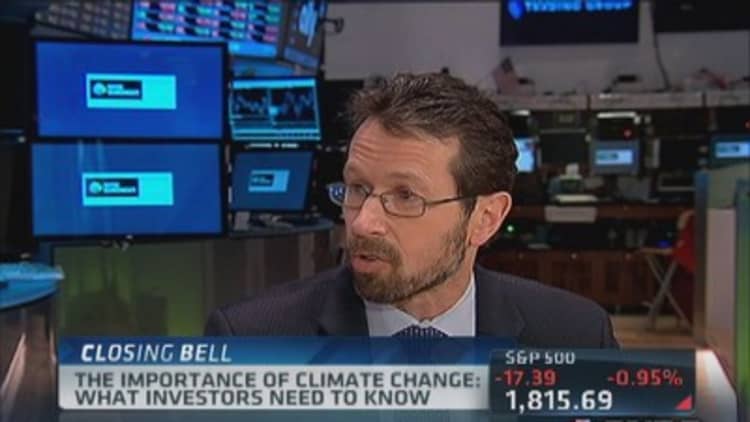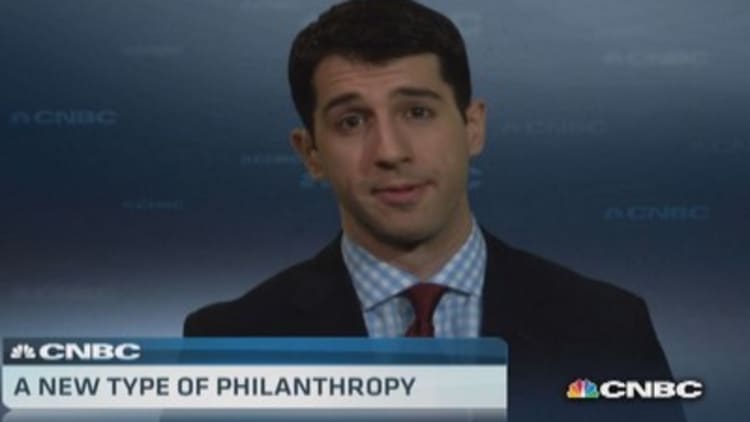Is Wall Street missing the biggest economic risk in the world?
That's what a trio of prominent hedge fund managers believe. Jeremy Grantham of $117 billion GMO, Chris Hohn of nearly $8 billion The Children's Investment Fund Management, and Steve Mandel of $27 billion Lone Pine Capital are giving millions of dollars to try and change it.
Each elite investor has given at least $1.5 million to back a new documentary series focused on the ramifications of global warming, "Years of Living Dangerously," which premiered on Showtime April 13.
The series is a collaboration with some of the biggest names in Hollywood. "Titanic" and "Avatar" director James Cameron, former United Artists head Jerry Weintraub, and actor-turned-politician Arnold Schwarzenegger are among the executive producers. Each episode features celebrity correspondents such as Matt Damon, Harrison Ford, Jessica Alba and Leslie Stahl.
The project blends journalism with activism. Created by former "60 Minutes" producers Joel Bach and David Gelber, the "Years" series tries to show the "current and intensifying effects of climate change on everyday Americans and demonstrate how they can take action and be part of the solution," according to promotional materials.
The first episode, for example, asserts that climate change is tied to things like joblessness in Texas and civil war in Syria, both of which the producers believe are fueled by unprecedented drought.
The concern of the hedge fund managers over climate change is two-fold: One, the general impact of global warming on the planet and its inhabitants, and two, how it will effect their investments.
"You may not be interested in that topic, but it's in my view the elephant in the room that investors have not understood," Hohn recently said in an Institutional Investor cover story on investing and climate change. (He was unavailable to comment for this article.)
Hohn has noted various likely effects of global warming, including lower crop yields, water shortages, and oil, gas and coal reserves that companies will be unable to mine because of future carbon taxes.
"Every industry is impacted. There's energy, vehicles, transportation, city planning," Hohn told Michael Peltz, editor of the magazine. "Agriculture is being destroyed. It's geopolitical: There will be war between India and China over water. Investors' heads are in the sand."
For years, part of Hohn's hedge fund profits went to the London-based charity led by his wife, The Children's Investment Fund Foundation. One of the group's focus areas is climate change, where it uses relativity risky, potentially high-impact grants targeting "system change, not merely incremental improvements," according to the foundation website.
Read More No one and nowhere immune to climate change: UN
Dan Abbasi, founder of Hohn-backed private equity firm GameChange Capital and another executive producer of the series, said he is amazed at how few in finance think seriously about the changing environment.
"It's shocking: people who run some of the largest investment portfolios in the world are incredibly sophisticated in assessing macro risks, but climate change barely registers. They don't know where to rank it in the stack and some have privately conceded to me that they have no idea how to play it," Abbasi said in an interview.
"It's no coincidence that some of the world greatest investors are backers of this. What I like is their boldness, their conviction, their big world view, their understanding of risk," he added about the investor supporters' penchant for independent and often contrarian views. "To be a successful investor, you don't look in the rear-view mirror, you look ahead to understand the risks coming at you."
"That's what these guys have made a living doing and been extraordinarily successful at."
A spokesman for Grantham declined to comment, but he pointed to the GMO co-founder's recent comments in the Institutional Investor story on why he funded the "Years" series.
"The reason I wanted to fund this was because Cameron was such a good propagandist in 'Avatar' that he had the audience I was in cheering for the blue creatures against what appeared to be red-blooded GIs just following their orders," Grantham said, referring the science fiction film that explored the effects of climate change in the 22nd century. "That's an amazing thing to do. So I figured, well, if anyone can help influence this issue and set the tone, he can."
Grantham is a longtime environmentalist who has warned about the investing impacts of climate change in his widely read client letters.
He has also recently opposed the construction of the controversial Keystone XL oil pipeline, which he believes would "disastrous for the environment," according to an interview in Fortune. In February 2013, Grantham was nearly arrested at a White House pipeline protest organized by the environmental group Sierra Club, for whom he is a lead supporter.
Grantham, like Hohn, was one of many advisors that the "Years'" team consulted with in shaping what the series covered. Grantham also appears on camera in an episode with New York Times columnist Tom Friedman.
Read MoreBattle of the billionaires erupts over Keystone
Mandel, the press-shy money manager who funded the series with his wife Sue, also declined to comment.
The Mandels give to environmental causes through the family charitable group they created, the ZOOM Foundation.
"We believe that we must act now to stop and reverse climate change," its website reads.
The hedge fund managers aren't the only prominent business people backing the "Years" series. Others include Microsoft co-founder Paul Allen, U.S. Venture Partners founder Bill Bowes, and former Continental Cablevision chairman and CEO Amos Hostetter, among others.
From Wall Street to conservation
While Wall Street has been slow to take climate change seriously, a small group of former financial professionals is active on the issue.
One of the most high-profile is Tom Steyer, who left the highly successful hedge fund firm he founded in 2012 to focus on preserving the environment.
"Given that I believe climate is the defining issue of our generation, I could not in good conscience continue to be in a business that, by definition, has to consider investments in virtually every sector of the global economy and does have investments in a full set of fossil fuel-related industries," Steyer told CNBC.com in December about leaving Farallon Capital Management.
Read MoreHere's a switch:Big hedge funders going nonprofit
Steyer has also teamed with former Treasury Secretary and Goldman Sachs head Hank Paulson and ex-New York City mayor Mike Bloomberg to study the economic cost of climate change, a project called "Risky Business."
Another example from the hedge fund world is Louis Bacon. While he runs the macroeconomic investment firm he founded, Moore Capital Management, Bacon has been a long-time environmental advocate focused on U.S. land and water conservation via his Moore Charitable Foundation.
Others to go from finance to environmental action include David Blood, the former CEO of Goldman Sachs Asset Management who co-founded sustainable investment firm Generation Investment Management with former Vice President Al Gore in 2004; Mark Tercek, who left Goldman Sachs after 24 years in 2008 to lead global conservation organization The Nature Conservancy; and Larry Linden, a partner at both McKinsey & Co. and later Goldman Sachs who retired in 2008 and founded the Linden Trust for Conservation.
More capital needed

Series executive producer Abbasi believes more capital needs to flow into companies and securities that mitigate climate change. While venture capital infusions into start-up alternative energy technologies is helpful, it's on too small a scale to make a big difference, according to Abbasi.
"The only way we are going to solve this problem is by investing across a range of asset classes," Abbasi said. "The kind of large-scale capital flows you're seeing with the formation of green bonds and securities and so forth—that is all just beginning."

Read MoreGoing green: why big investors are excited about a 0.62% coupon bond
Abbasi believes that Wall Street needs to innovate more climate change-related products, especially liquid ones that are easy to invest in. A liquid investment is something that can be bought and sold with little delay, such as a common stock or index fund.
"Sadly," he said, "there aren't a ton of examples where I can just say,'look, here's where we're seeing--beyond our group of backers---tremendous initiative being shown right now.'"






